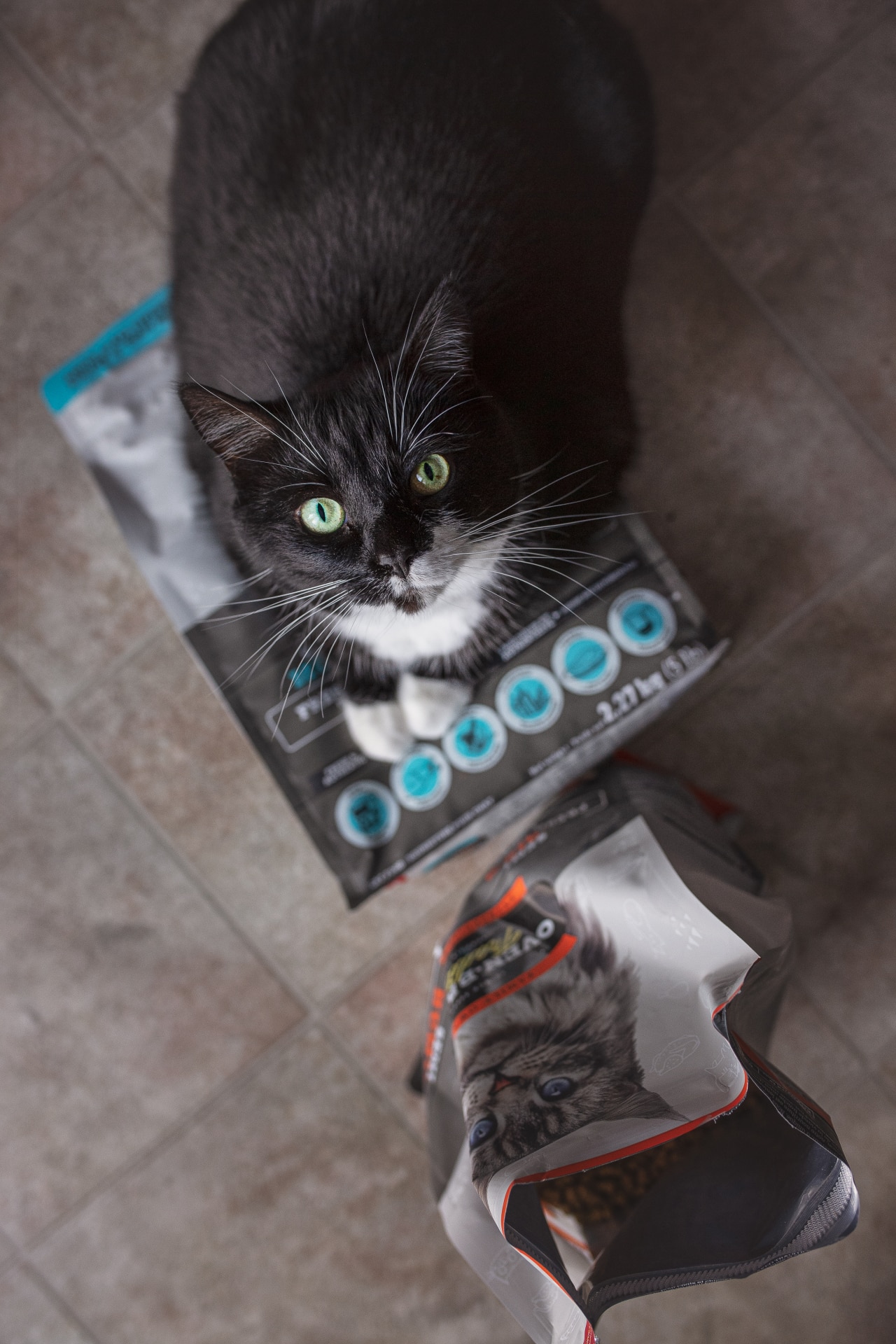Bringing home a new puppy is an exciting adventure, full of excitement, cuddles, and let’s be real, a few sleepless nights. You might find yourself thinking, Am I really ready for this? Raising a happy, healthy puppy is a big responsibility, but with the right essentials, you can set them up for success from day one.
From the right nutrition to essential training tools and comfort items, giving your puppy the best possible start means having the right essentials in place. One of the most important choices? A high-quality puppy formula designed to support their growth and development. Puppies have unique nutritional needs and feeding them the right food helps set the foundation for lifelong health.
That’s where Oven-Baked Tradition comes in. Our carefully crafted puppy formulas are made with fresh ingredients and slowly baked to preserve nutrients, ensuring your little one gets the best start in life. In this guide, we’ll walk you through everything you need to welcome your new puppy home, stress-free. Because every puppy deserves a strong, healthy start!
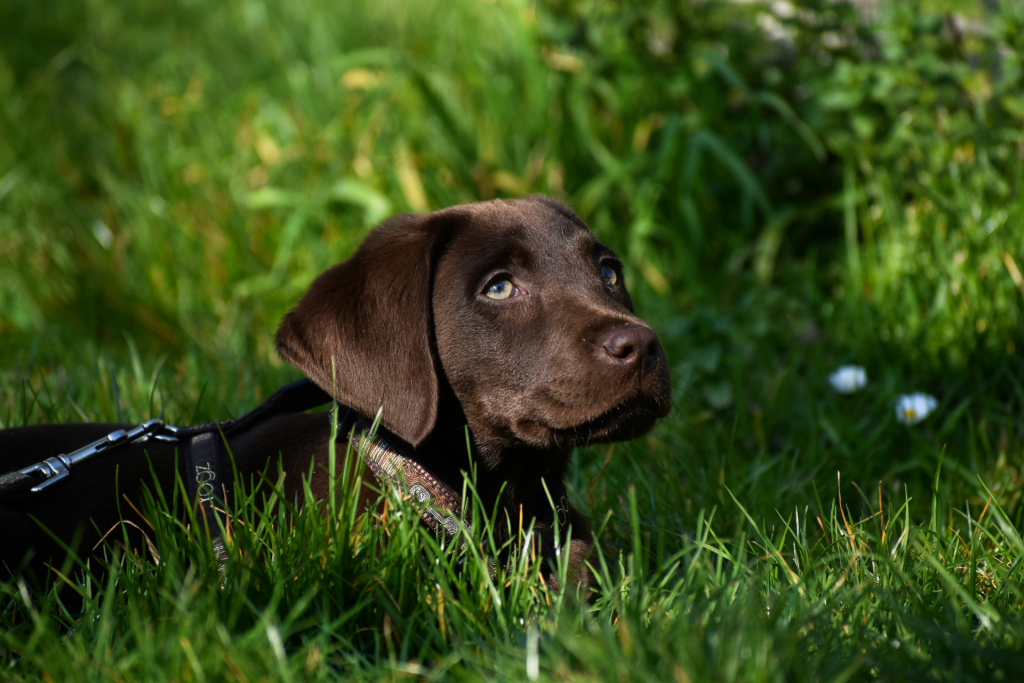
Find a Veterinarian For Your Puppy
Regular vet visits are essential for ensuring your new puppy grows up happy and healthy. During those crucial early months, veterinarians recommend check-ups every three to six weeks. These visits help track your puppy’s development, catch any potential health concerns early, and keep vaccinations up to date.
Building a relationship with a trusted veterinarian is just as important as choosing the right puppy food, both play a key role in setting your puppy up for a lifetime of wellness!
Puppies need essential vaccines so they can safely enjoy the outdoors and socialize with other pups.
Setting your new puppy up with a trusted veterinarian is one of the best ways to ensure a happy, healthy start. A great vet makes puppy ownership easier by guiding you through every stage of your puppy’s growth. But how do you choose the right one? Keep these key factors in mind:
- Location matters: A vet that’s close to home makes routine visits simple and ensures you can get care quickly in case of an emergency.
- Comprehensive services: Look for a vet who offers essential care for your puppy, including dental health and disease prevention.
- Experience counts: If possible, choose a vet who regularly works with your puppy’s breed. A knowledgeable professional can help create a stress-free experience using proven techniques.
When you speak with your vet, it becomes clear that preventative care is the cornerstone of a healthy life for your puppy. Keeping your puppy’s vaccinations up to date, and protecting them against fleas, ticks, and heartworms, is essential to ensure they grow strong and stay happy.
Regular check-ups, vaccinations, and preventive treatments are not only important for maintaining your puppy’s health but also play a significant role in avoiding costly medical issues down the road. By staying proactive, you’re setting your new puppy up for success!
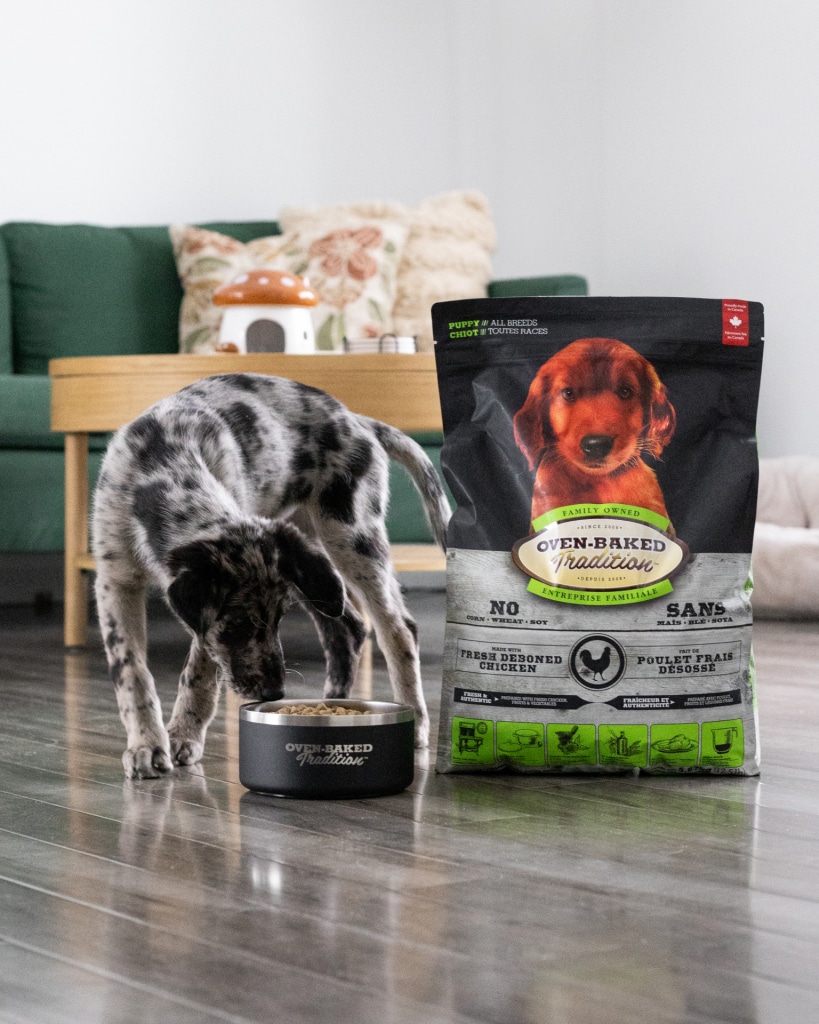
What’s the right puppy food for your new pup?
As a new puppy parent, ensuring you have high-quality puppy food on hand. A healthy puppy is a hungry puppy, and the right nutrition is the foundation for their growth and development.
If your puppy will be 50 pounds or more by the time they’re an adult, they may require large-breed puppy food. Be sure to choose the proper nutrition for your puppy.
Oven-Baked Tradition recommends feeding your puppy at regular intervals throughout the day. This helps establish a consistent routine, promoting good behavior while fostering healthy eating habits that will last into adulthood. A structured feeding schedule also aids in digestion and overall well-being. Additionally, we recommend avoiding strenuous exercise immediately after meals. Giving your puppy some time to digest helps prevent discomfort and ensures they feel their best.
Train Your Puppy Using Treats
Bonding with your puppy using treats is a key part of building a strong relationship. It’s a way to reward them and share a special moment when they truly deserve it. Using rewards like toys or treats helps teach your puppy good manners and reinforces positive behaviors.
To effectively train your puppy, reward them immediately after they follow directions or display a new habit. This helps your puppy understand what’s expected and encourages them to repeat the desired behavior in the future. A consistent reward system can make training enjoyable for both you and your new puppy!
However, it’s important to avoid giving treats too often, as most of your puppy’s daily calories should come from their regular meals. This balance helps maintain a healthy weight while still providing plenty of opportunities for positive reinforcement
Puppy Must Haves For Home and Travel
Before welcoming your new puppy into your home, it’s important to stock up on supplies that will make life easier for both you and your pet. Puppies have a lot of growing to do and their specific needs can change quickly. Oven-Baked Tradition is here to guide you, through what you’ll need for every puppy situation.
- Puppy potty training gear
Patience is key when it comes to potty training your new puppy, and accidents are a part of the process. To prevent mishaps, stock up on plenty of pee pads. These will be a lifesaver during those early days as your puppy learns where and when it’s time to go. Additionally, consider using home cleaning supplies specifically designed to tackle pet accidents. These products will help you maintain a clean space while your puppy adjusts to its new home, making the training process smoother for both of you.
- Dog identification
An easily visible ID tag is essential for identifying your dog quickly if they get lost, and it will also make traveling with your canine much easier. Be sure to invest in a durable ID tag and consider microchipping your puppy for added security. If you live in an area that requires dog identification, be sure to familiarize yourself with the local regulations to ensure your puppy is properly registered. This will help keep your furry friend safe and make any emergencies easier to handle.
- Collar, harness, leash
When selecting a collar, harness and leash for your new puppy, it’s important to choose options that are designed for their age, size, and breed. Puppies can be more sensitive than older dogs, so look for products that offer comfort while providing control. A well-fitting collar or harness will ensure safety and help your puppy feel secure. Be sure to ask your pet specialty store for recommendations on the best supplies for your puppy’s specific needs.
- Dog carriers
A reliable dog carrier is a must-have to ensure your furry friend’s safety and comfort during travel. Whether it’s a quick trip to the vet or a road trip, investing in a durable and comfortable carrier will make every journey easier and more enjoyable for both you and your puppy.
- Water and food bowls
Your growing puppy needs easy access to water and a designated place to eat. Providing them with their own water and food bowls not only saves your personal dinnerware, but also helps your puppy understand what belongs to them. To make mealtime even more engaging, consider investing in a puzzle bowl or a dog dish with dividers to slow down their eating and promote healthier, more mindful eating habits. It’s an easy way to ensure your puppy stays hydrated and nourished while fostering good behavior from the start.
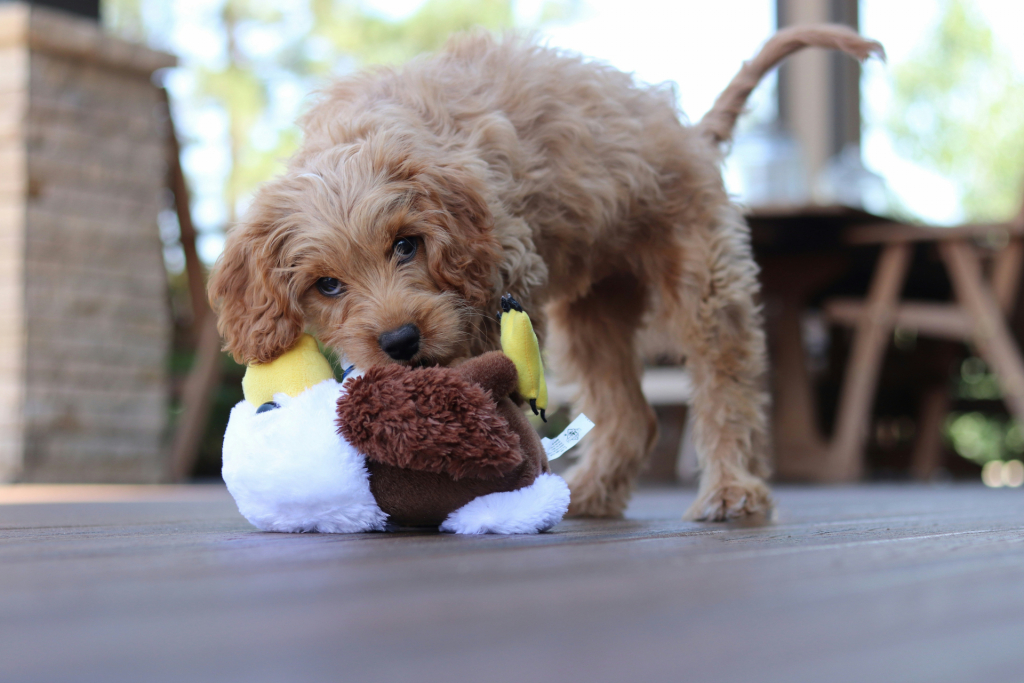
Puppy Toys: Essential for fun and development
Allocating time each day to engage and connect with your new puppy is crucial for building a strong bond. It’s equally important to ensure they have plenty of opportunities for independent play. High-quality puppy toys, specifically designed for developing dogs, can be a great way to keep your puppy entertained and help them grow both physically and mentally. When selected toys, go for something durable and safe that won’t easily break apart. Toys can also be a lifesaver when you’re visiting friends or traveling, keeping your puppy out of trouble while you’re busy.
To avoid overwhelming your puppy, limit the number of toys available at any given time. Focus on options that serve different purposes:
- Sturdy chew toys: These are great for teething puppies and help prevent them from gnawing on your furniture or shoes.
- Fetch toys: Not only are these excellent for active play and teaching discipline, but they also provide a fun and safe way for your puppy to engage with you, especially outdoors.
- Plush toys: These can be used for cuddling and various types of play. Plus, they provide your puppy with something comforting at the end of a fun-filled day.
Bedding for Your Puppy: Comfort and rest for healthy growth
When preparing for your new puppy, one of the essential supplies you’ll need is a comfortable bed. A good night’s sleep is vital for your puppy’s growth and well-being. A cozy bed encourages rest and supports a healthy sleep schedule, allowing your puppy to recharge for their next adventure.
Here are some factors to consider when choosing the perfect bed for your new puppy:
- Durability. Puppies can be tough on their belongings, especially when they’re teething. Look for a bed that can withstand puppy teeth and rough play. Beds with minimal fillers are ideal, but if you have a breed prone to sharp teeth, consider investing in a more durable option.
- Ease of cleaning. Accidents are bound to happen with puppies, so you’ll want a bed that’s easy to clean. Beds with removable, washable covers or those that fit in the washing machine are the best options. This will save you time and hassle, ensuring your puppy always has a clean and comfy place to rest.
- Size. Puppies come in all shapes and sizes, so make sure their bed fits their unique needs. Don’t just buy the biggest bed available; puppies often enjoy beds that make them feel cozy and snug. The right size helps them feel secure and content, especially during their early development.
- Design. Consider your puppy’s lifestyle and your own when choosing the bed’s design. Will you be traveling with your puppy often? Or do you need an outdoor bed for sunny days? Look for a design that suits both your puppy’s needs for comfort and your lifestyle. As your puppy grows, if they can no longer stretch out comfortably, it’s time to upgrade to a larger bed.
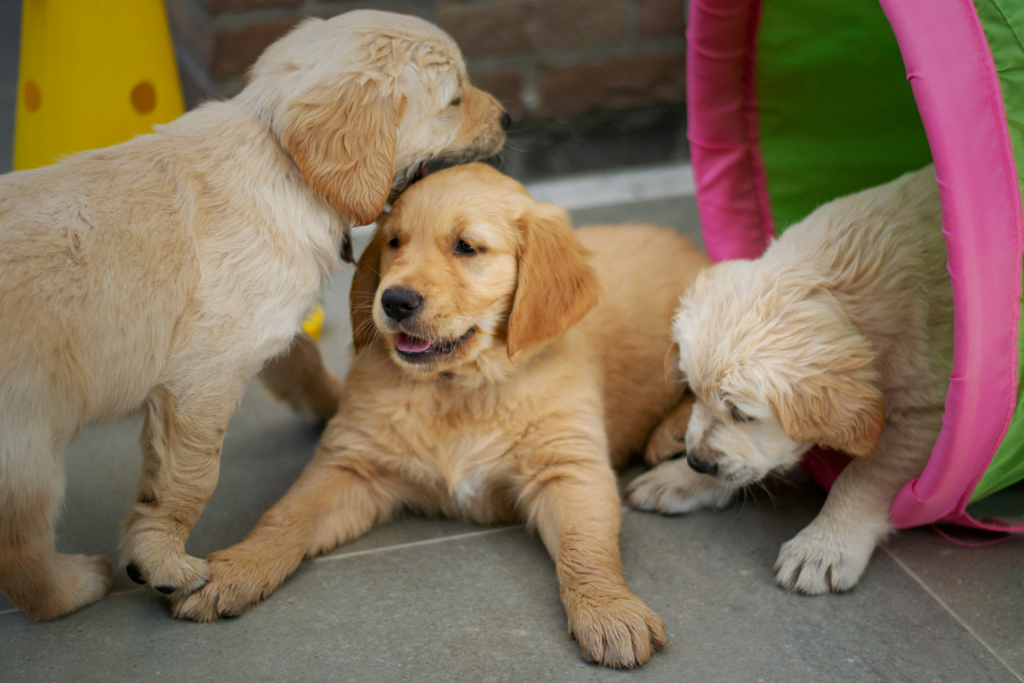
Socialization for Your Puppy
Socialization is a crucial part of raising a well-adjusted, confident puppy. It helps them learn how to interact positively with new people, animals, and environments, reducing fear and anxiety while fostering good behavior. The more positive experiences your puppy has early on, the better they’ll adapt to new situations throughout their life. Here are a few things to consider:
What Is Puppy Socialization?
Puppy socialization is the process of helping your young dog learn how to interact positively with people, other animals, and their environment. During this critical stage, a puppy’s brain is highly receptive to new experiences, making it the perfect time to introduce them to different sights, sounds, and situations. However, these introductions should be done carefully to ensure they build confidence rather than fear.
Why Is Socializing a Puppy Important?
Socialization is crucial because dogs are expected to handle a wide variety of situations throughout their lives. Whether they live in a quiet suburb or a bustling city, dogs encounter different people, sounds, and environments daily. Without early exposure, they may become anxious or reactive in new situations. Strangers and children may approach your dog, eager to pet them, sometimes without asking. Socialization will teach them to adapt to these interactions and objects in a respectable way.
When Should You Socialize a Puppy?
The ideal socialization window for a puppy is between 3 and 12 weeks of age, as this is when they are most receptive to new experiences. For some puppies, this critical period may extend to 16 or even 20 weeks, depending on their breed, personality, and how actively their owner engages in socialization. Early, positive exposure to different environments, people, and animals helps shape a well-adjusted adult dog.
How To Socialize a Puppy
Before introducing your puppy to the world, make sure it’s safe to do so. Start with controlled settings where you can monitor their interactions and gradually increase exposure to new experiences. Be mindful of what they may interact with to keep them safe during socialization outings. Keep a blanket or mat with you when visiting public areas so your puppy has a familiar spot to retreat to when needed. Allow your puppy to meet new people and pets but always supervise to ensure positive and stress-free encounters.
What You Should Expose Your Puppy To
Socialization goes beyond simply meeting people and playing with other dogs. While these are important aspects, the true goal is to help your puppy feel comfortable and confident in a variety of environments, situations, and experiences. Puppies need to be exposed in a friendly way to:
• People: Start with your closest family members. If you have regular visitors or a group of friends, introduce them next.
• People Doing Everyday Activities: Let your puppy observe daily actions like cooking, cleaning, or exercising. Keep them nearby while running errands or moving around the house.
• Other Animals: If you have other pets, your puppy will naturally get used to them. But don’t forget to introduce them to well-behaved animals belonging to friends or family.
• New places: Get them comfortable with environments they’ll frequently visit, such as the car, the vet’s office, sidewalks, and shopping areas. The more they experience these settings, the more confident they’ll become
• Handling: Your puppy should get used to being handled for grooming, vet visits, and interactions with children or strangers. Practice gentle petting, brushing, and even light hugging to help them feel at ease.
This is just a starting point, focus on what your puppy struggles with and reinforce positive experiences to help them adapt.
Bringing a new puppy into your life is one of the biggest adventures you’ll go on. With the right preparation and care you’ll built a strong bond and create lasting memories with your new companion. Oven-Baked Tradition wants you to remember, patience and love are your best tools when welcoming a puppy into your home! Enjoy every moment!
